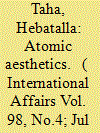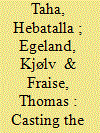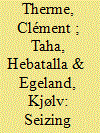|
|
|
Sort Order |
|
|
|
Items / Page
|
|
|
|
|
|
|
| Srl | Item |
| 1 |
ID:
186986


|
|
|
|
|
| Summary/Abstract |
How was the atomic age visualized in Egypt in the years immediately after the creation of the bomb? What role did gendered images, symbols and metaphors play in narrating and normalizing nuclear technology? How can these help us understand nuclear policy today? This article engages visual and textual media, including satirical magazines, cultural journals and film. It presents a plurality of images: the depiction of the bomb as an egg, as a miniscule and aesthetically pleasing object, alongside more alarming illustrations of the bomb as a monster. Through fluid and unstable visualizations, nationalist modernizers highlighted the ambivalence of nuclear technology, seen as containing potential for postcolonial rebirth and global death simultaneously. By exploring nuclear imaginaries from the decolonizing world, the article challenges the dominant narratives, histories and aesthetics of the atomic age. Despite the continuous reiteration of nuclear weapons as masculine in feminist International Relations, this conceptualization is not necessarily universal, and this research illustrates that feminizing nuclear imagery can still reinforce the nuclearized world. Considering visualization from, and not only of, the global South, the article emphasizes that people in non-nuclear weapons-possessing states also participated in the production of the nuclear-armed world and in discussions on the nuclear condition.
|
|
|
|
|
|
|
|
|
|
|
|
|
|
|
|
| 2 |
ID:
185831


|
|
|
|
|
| Summary/Abstract |
Looming decisions on arms control and strategic weapon procurements in a range of nuclear-armed states are set to shape the international security environment for decades to come. In this context, it is crucial to understand the concepts, theories, and debates that condition nuclear policymaking. This review essay dissects the four editions of The Evolution of Nuclear Strategy, the authoritative intellectual history of its subject. Using this widely acclaimed work as a looking glass into the broader field of nuclear security studies, we interrogate the field's underlying assumptions and question the correspondence between theory and practice in the realm of nuclear policy. The study of nuclear strategy, we maintain, remains largely committed to an interpretive approach that invites analysts to search for universal axioms and to abstract strategic arguments from the precise circumstances of their occurrence. While this approach is useful for analysing the locutionary dimension of strategic debates, it risks obscuring the power structures, vested interests, and illocutionary forces shaping nuclear discourse. In the conclusion, we lay out avenues for future scholarship.
|
|
|
|
|
|
|
|
|
|
|
|
|
|
|
|
| 3 |
ID:
187316


|
|
|
|
|
| Summary/Abstract |
In this article, we interrogate some of the central assumptions in the literature on Iran's nuclear behavior, including the role of the United States as a benevolent hegemon, the revisionist character of the Iranian government, the utility and efficacy of sanctions, and the widespread assumption that Iran is bent on obtaining and even using the bomb. We maintain that contemporary debates on the Iranian nuclear issue display similarities to Kremlinology during the Cold War, being deeply politicized and subject to bias and self-censorship. We conclude by highlighting ways for scholars to recast the discussion.
|
|
|
|
|
|
|
|
|
|
|
|
|
|
|
|
|
|
|
|
|